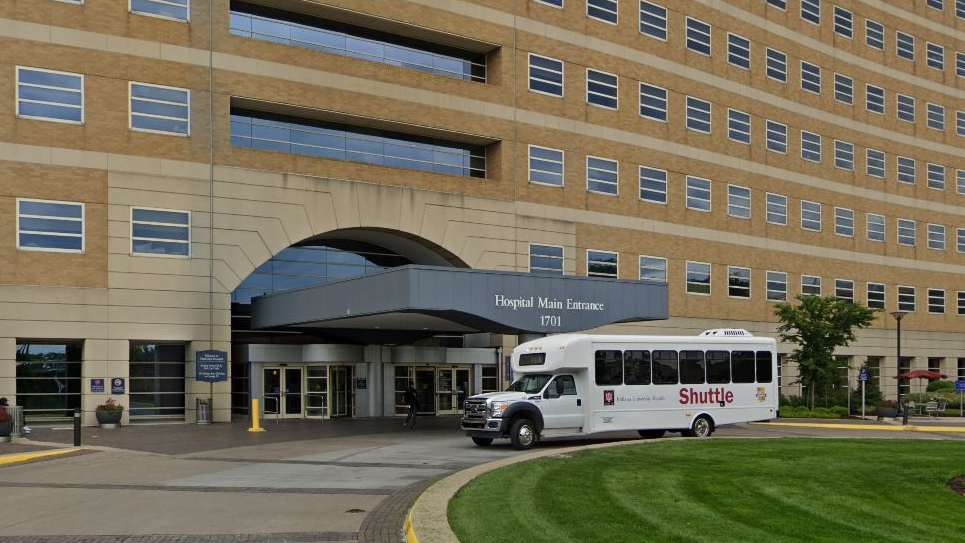IU Health University Hospital Rapid Response: Your Ultimate Guide To Immediate Healthcare Solutions
When it comes to healthcare emergencies, time is of the essence. IU Health University Hospital Rapid Response is a game-changer in the world of medical care, offering swift and efficient solutions for patients in need. Whether you're dealing with a sudden illness or an unexpected injury, this program ensures that help is just moments away. Let’s dive into what makes IU Health University Hospital Rapid Response such a vital part of modern healthcare.
Imagine walking into a hospital where every second counts, and the medical team is already prepared to handle whatever comes their way. That's exactly what IU Health University Hospital Rapid Response delivers. This isn't just about treating symptoms; it's about addressing the root cause of medical emergencies with precision and speed.
In today's fast-paced world, people demand more from their healthcare providers. IU Health University Hospital Rapid Response steps up to the plate, providing not only rapid care but also personalized attention to ensure the best outcomes for patients. It’s a blend of technology, expertise, and compassion that sets this program apart.
Read also:Spiralling Spirit Unleashing The Power Within
Understanding IU Health University Hospital Rapid Response
What Is IU Health University Hospital Rapid Response?
IU Health University Hospital Rapid Response is a specialized initiative designed to tackle medical emergencies head-on. This program leverages cutting-edge technology and highly trained professionals to deliver timely interventions. It operates on the principle that early detection and treatment can significantly improve patient outcomes.
Think of it as a superhero team for hospitals. When a patient shows signs of distress, the rapid response team springs into action, assessing the situation and implementing life-saving measures within minutes. This proactive approach helps prevent minor issues from escalating into major crises.
Why Is Rapid Response Important?
Let’s face it—medical emergencies don’t wait for convenient times. That’s why having a rapid response system in place is crucial. Research shows that quick intervention can reduce mortality rates by up to 30%. IU Health University Hospital Rapid Response plays a pivotal role in saving lives by ensuring that patients receive the care they need as soon as possible.
Here are some key benefits of rapid response:
- Immediate assessment and treatment
- Reduced risk of complications
- Improved patient satisfaction
- Enhanced communication between healthcare providers
How IU Health University Hospital Rapid Response Works
The Process from Start to Finish
When a patient exhibits signs of distress, the rapid response team is alerted immediately. This could be triggered by nurses, doctors, or even automated systems that monitor vital signs. Once alerted, the team assembles and heads to the patient’s location without delay.
Upon arrival, the team conducts a thorough evaluation. They check vital signs, review medical history, and perform any necessary tests. Based on their findings, they develop a treatment plan tailored to the patient’s specific needs. The entire process is streamlined to minimize delays and maximize efficiency.
Read also:Anjli Arora Porn Videos
Key Players in the Rapid Response Team
Behind every successful rapid response lies a team of dedicated professionals. Here’s a breakdown of who’s involved:
- Critical Care Physicians: Experts in handling life-threatening conditions.
- Nurses: Trained to provide immediate care and monitor patient progress.
- Respiratory Therapists: Specialists in managing breathing issues.
- Pharmacists: Ensuring the right medications are administered promptly.
Each member brings unique skills to the table, creating a cohesive unit that works seamlessly together. It’s like a well-oiled machine, where everyone knows their role and executes it flawlessly.
The Role of Technology in Rapid Response
Embracing Innovation for Better Outcomes
Technology plays a significant role in the success of IU Health University Hospital Rapid Response. Advanced monitoring systems alert the team to potential issues before they become critical. These systems track everything from heart rate to oxygen levels, providing real-time data that guides decision-making.
In addition to monitoring, telemedicine has become an integral part of rapid response. Through video consultations, specialists can weigh in on cases from remote locations, ensuring that patients receive the best possible care no matter where they are.
Challenges and Solutions in Implementing Technology
While technology offers numerous advantages, it’s not without its challenges. Issues like data privacy and system reliability must be addressed to ensure smooth operations. IU Health University Hospital tackles these challenges by investing in robust cybersecurity measures and conducting regular system checks.
Training staff to use new technologies effectively is another hurdle. To overcome this, the hospital offers comprehensive training programs that keep employees up-to-date with the latest advancements.
Impact on Patient Care
Improving Patient Outcomes
The impact of IU Health University Hospital Rapid Response on patient care is undeniable. Patients who receive rapid intervention are more likely to recover fully and return to their daily lives sooner. This not only benefits the individual but also alleviates pressure on healthcare systems by reducing hospital stays.
Stories of success abound. From saving a patient experiencing cardiac arrest to stabilizing someone with severe respiratory distress, the rapid response team has countless examples of lives transformed through their efforts.
Patient Satisfaction and Feedback
Patient satisfaction is a top priority for IU Health University Hospital. Surveys show that patients appreciate the speed and efficiency of the rapid response team. Many have expressed gratitude for the compassionate care they receive during what can be a stressful and frightening time.
Feedback is continuously collected and analyzed to identify areas for improvement. This commitment to excellence ensures that the program remains at the forefront of healthcare innovation.
Training and Education for Rapid Response Teams
Preparing the Next Generation of Healthcare Providers
Training is a critical component of IU Health University Hospital Rapid Response. The hospital invests heavily in developing programs that equip staff with the knowledge and skills needed to excel in high-pressure situations. Simulation exercises and scenario-based learning are just a few of the methods used to prepare teams for real-world challenges.
Continuing education is also emphasized, with regular workshops and seminars offered to keep staff informed about the latest trends and techniques in rapid response care.
Collaboration with Educational Institutions
IU Health University Hospital partners with leading educational institutions to enhance training programs. These collaborations bring together experts from various fields, fostering an environment of innovation and discovery. Students and professionals alike benefit from these partnerships, gaining valuable insights and experiences that prepare them for successful careers in healthcare.
Challenges Facing Rapid Response Programs
Overcoming Obstacles in Healthcare
Despite its many successes, IU Health University Hospital Rapid Response faces several challenges. Budget constraints, staffing shortages, and evolving medical needs all pose potential roadblocks. However, the hospital remains committed to overcoming these obstacles through strategic planning and resource allocation.
Innovative solutions, such as leveraging technology and optimizing workflows, help mitigate these challenges. By staying adaptable and open to change, the program continues to thrive and deliver exceptional care to patients.
Future Developments in Rapid Response
Looking Ahead to the Next Generation of Care
The future of rapid response looks bright. Advances in artificial intelligence and machine learning promise to enhance predictive capabilities, allowing teams to intervene even earlier. Wearable technology and remote monitoring systems will further expand the reach of rapid response programs, making care more accessible than ever before.
As the healthcare landscape evolves, IU Health University Hospital Rapid Response will continue to adapt and grow, ensuring that patients receive the best possible care no matter what challenges arise.
Conclusion: Join the Movement for Better Healthcare
IU Health University Hospital Rapid Response represents the pinnacle of modern healthcare innovation. By combining expertise, technology, and compassion, this program sets a new standard for emergency care. Whether you’re a patient, healthcare provider, or simply someone interested in the future of medicine, there’s much to learn from this remarkable initiative.
We encourage you to share your thoughts and experiences in the comments below. Together, we can create a community dedicated to improving healthcare for everyone. Don’t forget to explore other articles on our site for more insights into the world of medicine.
Table of Contents
- Understanding IU Health University Hospital Rapid Response
- Why Is Rapid Response Important?
- How IU Health University Hospital Rapid Response Works
- Key Players in the Rapid Response Team
- The Role of Technology in Rapid Response
- Challenges and Solutions in Implementing Technology
- Impact on Patient Care
- Patient Satisfaction and Feedback
- Training and Education for Rapid Response Teams
- Collaboration with Educational Institutions
- Challenges Facing Rapid Response Programs
- Future Developments in Rapid Response
- Conclusion: Join the Movement for Better Healthcare


